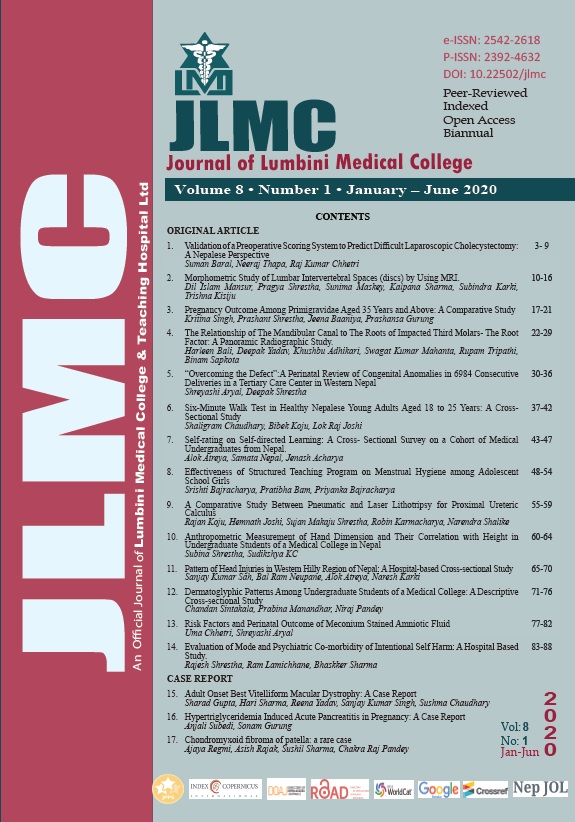Pregnancy Outcome Among Primigravidae Aged 35 Years and Above: A Comparative Study
Keywords:
Elderly primigravidae, Maternal age, Pregnancy outcomeAbstract
Introduction: Maternal age is an important determinant of pregnancy outcome. Women aged 35 years or more at their first pregnancy are considered high risk as they are associated with increased adverse maternal and perinatal outcomes.
Methods: A retrospective, comparative study was carried out over a period of two years in a tertiary center. Each elderly primigravida was matched with two primigravid women aged 20-34 years who delivered during the same period. Secondary data on obstetric outcomes (diabetes, oligohydramnios, polyhydramnios, hypothyroidism), postpartum complications (post-partum hemorrhage, postpartum eclampsia) and perinatal outcome (intra-uterine growth restriction, prematurity, congenital anomalies, and neonatal death)of 82 elderly primigravidae (study group) was compared to 164 younger primigravida (control group) delivered during the period of study. The Chi Square test and Fisher’s Exact test were used for statistical analysis and p value of <0.05 was taken as level of significance.
Results: During the study period, there were 15,012 deliveries and 82 of these were elderly primigravidae giving an incidence of 0.55%. The mean age of the elderly primigravidae was 36.8±2.16 years. The study group had more antepartum complications with preterm labor, diabetes in pregnancy, hypertensive disorders in pregnancy, multiple pregnancy and polyhydramnios (p<0.05). Seventy-one elderly primigravidae were delivered by caesarean section, the commonest indication being maternal request. The study group had higher incidence of post-partum hemorrhage but no perinatal mortality of significant proportion.
Conclusion: Maternal age at the first pregnancy influences pregnancy and neonatal outcomes. Hence, elderly primigravidae should be considered as high risk and followed up accordingly.
Downloads
Downloads
Published
How to Cite
Issue
Section
License
Copyright (c) 2020 Kritina Singh, Prashant Shrestha, Jeena Baaniya, Prashana Gurung

This work is licensed under a Creative Commons Attribution 4.0 International License.
The Journal of Lumbini Medical College (JLMC) publishes open access articles under the terms of the Creative Commons Attribution(CC BY) License which permits use, distribution and reproduction in any medium, provided the original work is properly cited.JLMC requires an exclusive licence allowing to publish the article in print and online.
The corresponding author should read and agree to the following statement before submission of the manuscript for publication,
License agreement
In submitting an article to Journal of Lumbini Medical College (JLMC) I certify that:
- I am authorized by my co-authors to enter into these arrangements.
- I warrant, on behalf of myself and my co-authors, that:
- the article is original, has not been formally published in any other peer-reviewed journal, is not under consideration by any other journal and does not infringe any existing copyright or any other third party rights;
- I am/we are the sole author(s) of the article and have full authority to enter into this agreement and in granting rights to JLMC are not in breach of any other obligation;
- the article contains nothing that is unlawful, libellous, or which would, if published, constitute a breach of contract or of confidence or of commitment given to secrecy;
- I/we have taken due care to ensure the integrity of the article. To my/our - and currently accepted scientific - knowledge all statements contained in it purporting to be facts are true and any formula or instruction contained in the article will not, if followed accurately, cause any injury, illness or damage to the user.
- I, and all co-authors, agree that the article, if editorially accepted for publication, shall be licensed under the Creative Commons Attribution License 4.0. If the law requires that the article be published in the public domain, I/we will notify JLMC at the time of submission, and in such cases the article shall be released under the Creative Commons 1.0 Public Domain Dedication waiver. For the avoidance of doubt it is stated that sections 1 and 2 of this license agreement shall apply and prevail regardless of whether the article is published under Creative Commons Attribution License 4.0 or the Creative Commons 1.0 Public Domain Dedication waiver.
- I, and all co-authors, agree that, if the article is editorially accepted for publication in JLMC, data included in the article shall be made available under the Creative Commons 1.0 Public Domain Dedication waiver, unless otherwise stated. For the avoidance of doubt it is stated that sections 1, 2, and 3 of this license agreement shall apply and prevail.
Please visit Creative Commons web page for details of the terms.




